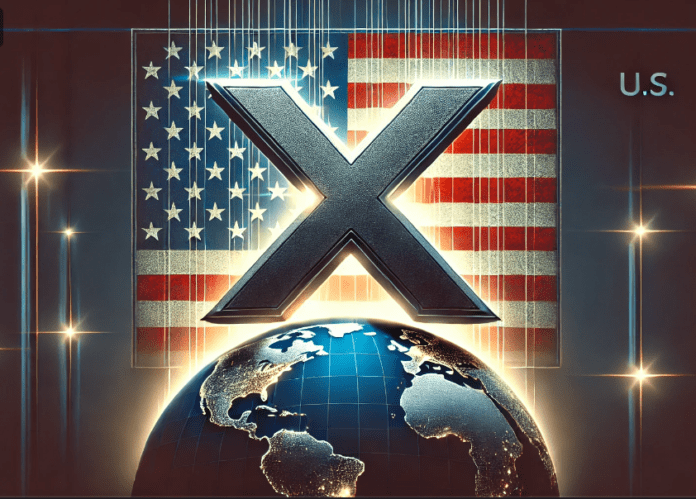With the Trump administration’s return, Silicon Valley elites have entered a transformative phase, positioning Elon Musk‘s platform X (formerly Twitter) as a potential global hub for discourse and influence. This alliance of powerful tech figures, including Musk, Peter Thiel, and Marc Andreessen, aligns strategically to support Trump’s vision, creating a scenario where X could dominate as the world’s primary communication platform.
The influence of these tech moguls, particularly with Musk’s financial backing and Andreessen’s aggressive stance on censorship, suggests that X is evolving from a social media platform into a powerful instrument of political, cultural, and financial sway. As advertisers eye a return to X, the platform holds the potential to be not only a tool for influence but a lucrative enterprise for Musk.
The Musk-Trump Nexus: An Unprecedented Influence Machine
Elon Musk’s proximity to Donald Trump, underscored by a shared philosophy on free speech and governance, has redefined X’s trajectory. Following a series of escalating investments and a decisive shift toward Trump-supportive stances, Musk has cemented himself as an influential player in Trump’s circle.
His surprise participation in a Trump-Zelensky call underscored his newfound role, hinting at X’s influence beyond domestic politics. This informal diplomatic debut may foreshadow X’s function as an intermediary in international discourse, aligning with the “America First” agenda while potentially prioritizing Musk’s corporate interests on a global stage.
The “Free Speech” Platform: Redefining the Rules of Online Censorship
Marc Andreessen, an outspoken supporter of Musk and an investor in X, has been a vocal critic of what he calls “criminal” advertiser boycotts against X. As Andreessen champions Musk’s platform as a bastion for “absolute free speech,” X finds itself on the cusp of a transformative role in media and communication. Andreessen’s framing of these boycotts as conspiratorial attacks on free speech reveals a deeper strategic ambition: reestablishing X as a premier platform where unmoderated discourse thrives, positioning it as the go-to network for individuals and institutions seeking a censorship-free digital experience.
Such rhetoric resonates with Trump’s base and the MAGA movement, which have long criticized traditional media’s handling of conservative content. This pivot not only gives Trump an invaluable channel for direct communication but also reinforces X’s narrative as a platform under siege by traditional media and regulatory powers. By positioning itself as a free-speech sanctuary, X could become indispensable for political messaging, particularly for right-leaning organizations and causes.
Peter Thiel’s Role: The Strategist Behind the Curtain
Although Peter Thiel has not openly supported Trump financially in this election cycle, his strategic influence looms large over this alliance. Known for his ideological alignment with conservative values, Thiel has consistently advocated for alternative media and counter-narratives to mainstream platforms. His involvement bolsters the tech-Trump partnership, hinting at the emergence of a platform that could outmaneuver traditional media’s stranglehold on news and political commentary.
Thiel’s presence suggests a concerted effort to cultivate a parallel media ecosystem where platforms like X control the flow of information, bypassing regulatory scrutiny and establishing a direct line to the public. This unprecedented alignment of tech moguls under a Trump administration presents a realignment of power that challenges the independence of traditional media outlets.
The Gates Divide: A Schism in Tech’s Political Landscape
In contrast to his peers, Microsoft founder Bill Gates distanced himself from the Trump camp, opting to support Kamala Harris and the Democratic agenda. This divergence placed Gates at odds with Musk, who, during the election cycle, accused him of connections to the Jeffrey Epstein network—a charge that underscores the increasingly brutal nature of the tech oligarchs’ tactics in this polarized climate. Musk’s incendiary accusations illustrate the lengths to which Trump-supporting tech elites are willing to go to dismantle perceived opposition within their own industry.
This internal schism hints at a deeper ideological battle within Silicon Valley, where figures like Musk and Andreessen rally around Trump, while those like Gates pursue more traditional, regulation-friendly approaches. This divide may further isolate Gates from the new tech power elite as X ascends as a central conduit for right-leaning political engagement.
Hypothesis: X as the World’s Dominant Influence Platform
The new alliance between the Trump administration and Silicon Valley elites could establish X as the preeminent platform for political and cultural influence, with Musk at the helm. If Andreessen’s push to restore advertisers’ confidence in X succeeds, this could transform X from a financial liability into a cash-generating powerhouse. This would not only consolidate Musk’s control over public discourse but potentially incentivize other social media platforms to adopt more lenient content moderation policies, reshaping the global online landscape.
With advertisers gradually returning and Musk’s influence expanding, X is poised to redefine the digital economy. Rebranding itself as a “free speech” platform could attract a steady stream of global brands eager to align with an audience that values unfiltered expression. Should X succeed in becoming a dominant hub for political discourse, the platform may emerge as the leading destination for high-stakes advertising, transforming Musk’s acquisition into a formidable wealth generator.
Global Implications: Shifting Power Dynamics and Regulatory Challenges
If X realizes its potential, its impact could extend far beyond American borders. An unregulated platform prioritizing free speech could amplify both American and international movements, from political campaigns to corporate messaging, reshaping the global influence hierarchy. This shift may create friction with governments and organizations championing stricter content controls, especially in Europe and parts of Asia, where digital governance leans toward more stringent regulation.
X’s rise as a central influence platform could prompt calls for regulatory oversight, challenging the Trump administration’s laissez-faire approach to tech policy. For countries observing the platform’s impact on U.S. discourse, X’s success may necessitate a new regulatory paradigm to address platforms wielding influence on a global scale without state intervention.





